U of A community protests budget cuts and tuition increases on Alberta Student Day of Action
In recognition of Alberta Student Day of Action, students and community members gathered on U of A's Main Quad and marched to the Alberta Legislature on March 28. There were over 30 individuals present at the event.
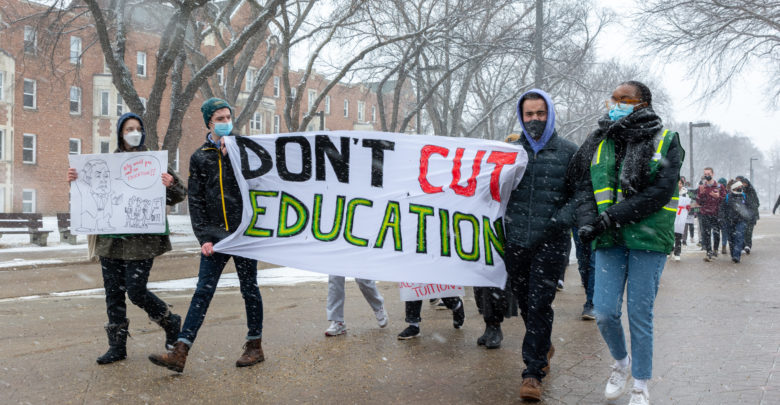 Lochlann Kerr
Lochlann KerrDespite snowy weather, University of Alberta community members gathered and marched to the Alberta Legislature to protest budget cuts and tuition increases at post-secondary institutions in the province.
Over the past three years, Alberta’s provincial government has cut funding to advanced education. The 2022 provincial budget dealt an 10.7 per cent funding cut to the U of A. The provincial government has reduced the U of A’s provincial grant by $222 million in the past three years. Additionally, the minister of advanced education approved exceptional tuition increases for eight undergraduate and four graduate programs at the university.
In recognition of Alberta Student Day of Action, students and community members gathered on U of A’s Main Quad and marched to the Alberta Legislature on March 28. There were over 30 individuals present at the event.
The protest was primarily organized by the U of A Students’ Union (UASU). Additionally, marching alongside the UASU were representatives from the Non-Academic Staff Association (NASA). A similar protest for Alberta Student Day of Action was held at the University of Calgary.
Rowan Ley, president of the UASU, thanked students, faculty, and community members for their presence at the protest despite the cold and snowy weather.
“I think the weather reflects our frosty feelings towards the provincial government’s recent budget,” Ley said. “You all are real ones for being out here in these conditions to show support for education, so thank you very much.”
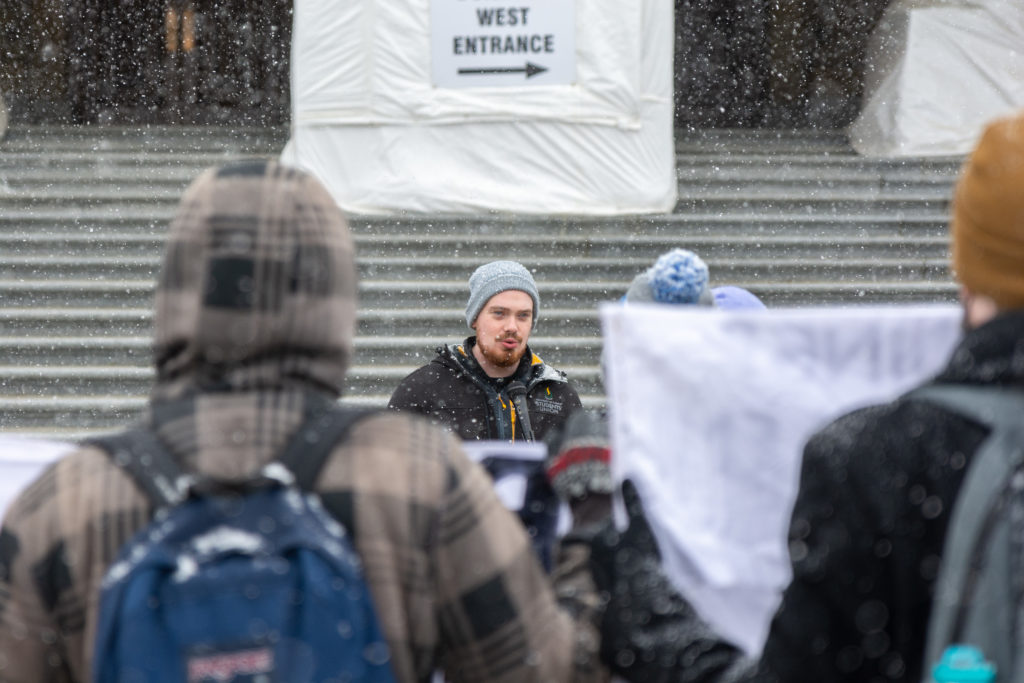
Rowan Ley, president of the UASU.
Ley noted that the budget cuts dealt to the U of A have been sizeable in comparison with other Canadian post-secondary institutions.
“We’re here because we are all at university to get an education that will enable us to contribute to our province and communities with the skills and connections that we need to succeed,” he said. “Instead of making that easier, our provincial government is choosing to make that harder every single day.”
“In the last three years, the Alberta government has cut almost $220 million from our university. These are some of the biggest cuts to any university in Canada since the Great Depression. Department offices have been closed, class sizes have ballooned, the quality of services have dropped dramatically, and students are not getting the value that we signed up for from our education.”
He also voiced concern over the effect exceptional tuition increases will have on young professionals in the province.
“Last month, the minister [of advanced education] approved a massive slate of exceptional tuition increases in professional programs like engineering and counselling psychology,” Ley said. “In a province where we claim to want to diversify our economy, making it this much harder to become a professional engineer is shameful. In a province that claims to take a mental health crisis seriously, doubling the cost of a degree in counselling psychology raises more barriers to helping people and making our community a better place.”
Students and community members express concerns over budget cuts and tuition increases during open microphone session
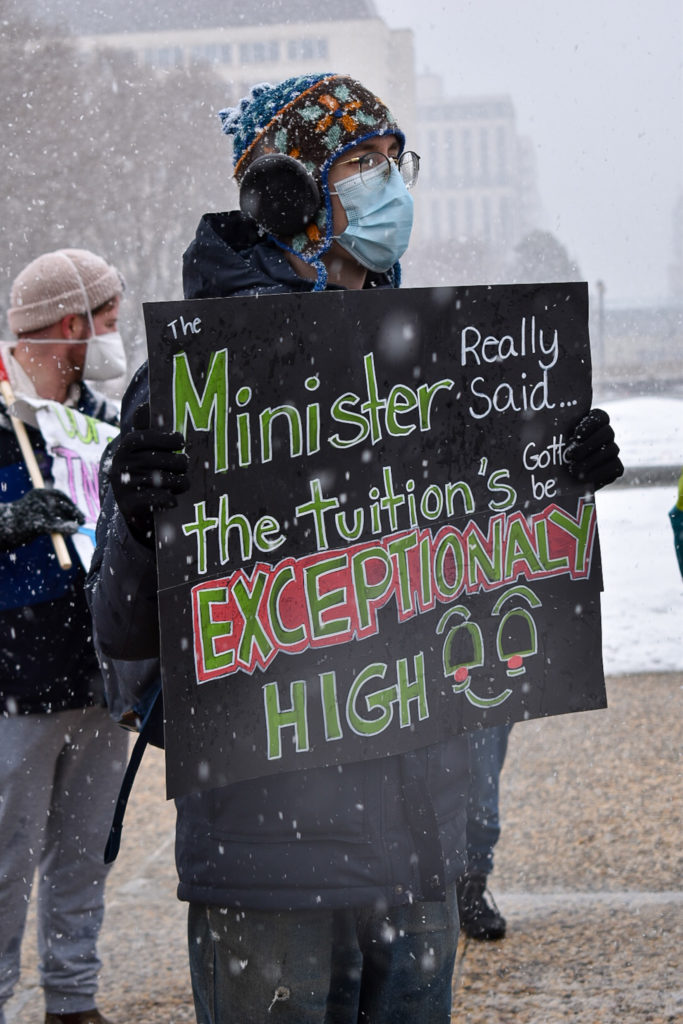
After Ley’s opening statements, the microphone was turned to event attendees to express their concerns regarding budget cuts and tuition increases.
Alexander Dowsey, third year ancient medieval studies student, detailed the effect budget cuts have had on the U of A’s department of history, classics, and religion.
“My home department is history, classics, and religion — three amalgamated departments all in one — teaching about 7,000 students a year,” Dowsey said. “We have no department office. We lost the entire staff during restructuring. My professors are having to fill out their own job application forms [and] job advertisements to hire new sessionals. They’re having to handle everything on top of handling all their classes and full teaching loads.”
“As you can imagine, it’s not a very healthy place.”
Joannie Fogue, third-year political science student and current Association des Universitaires de la Faculté Saint-Jean (AUFSJ) president, took the microphone next to explain the effects budget cuts have had on Campus Saint-Jean (CSJ). Fogue is also the UASU vice-president (student-life) elect for the 2022-2023 academic year.
“Briefly, all I can say is we’re pissed and we have been pissed for many decades now… I am a student in the arts program, and [starting in my second year] I was no longer able to complete my degree entirely in French,” Fogue said. “I can speak English and I do feel comfortable going to North Campus and taking these courses, but a lot of our students who are international students and who only understand French are not able to have the same advantages as me.”
“The provincial government needs to make sure that French post-secondary education is a priority, because currently it is not. We need long-term funding, and we need to stop using [CSJ] as something that they can [bring up] when elections come up because we are a priority and we should matter to them.”
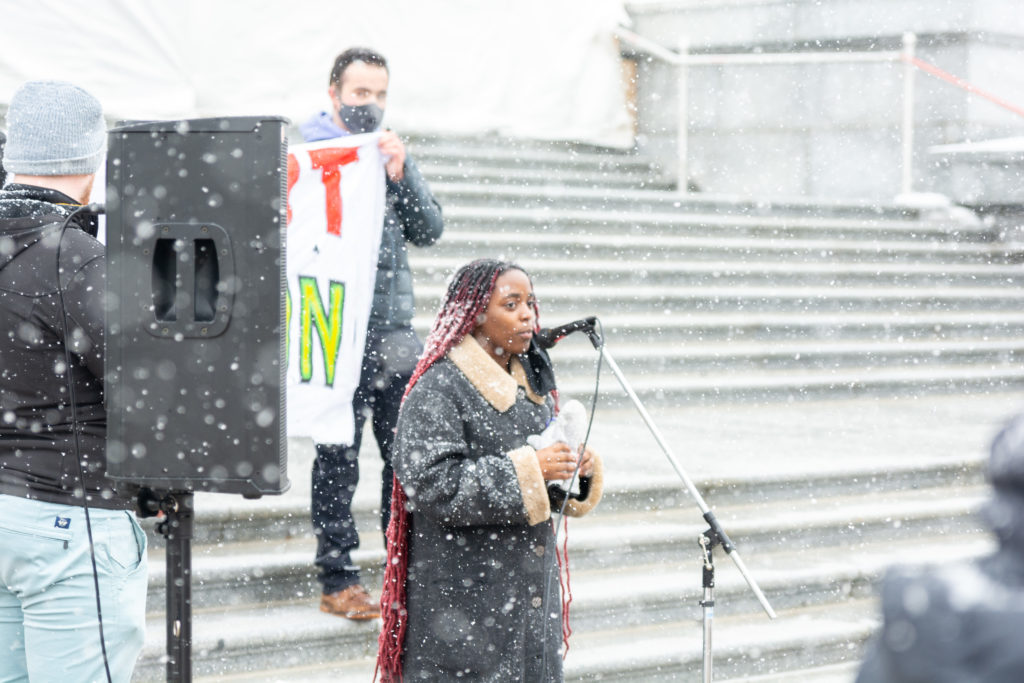
Joannie Fogue, third-year political science student and current Association des Universitaires de la Faculté Saint-Jean (AUFSJ) president.
Adrian Wattamaniuk, current president of the Engineering Students’ Society and undergraduate Board of Governors (BoG) representative spoke on how exceptional tuition increases can reduce accessibility for underrepresented groups in engineering.
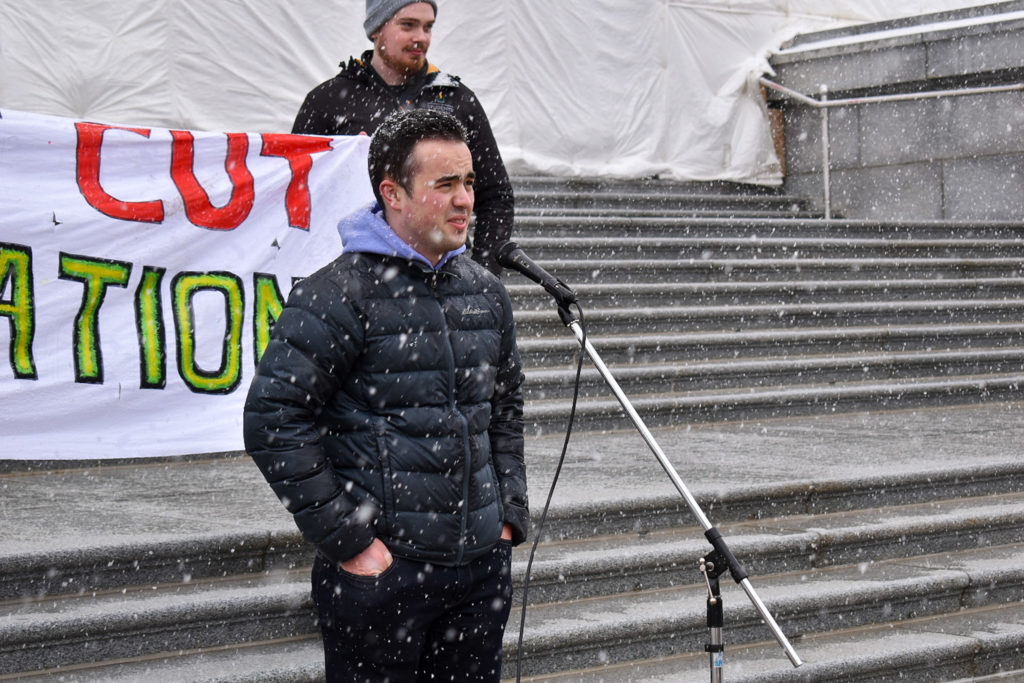
According to Wattamaniuk, exceptional tuition increases are “limiting the accessibility” of post-secondary programs. The exceptional tuition increases raised a bachelor of science in engineering’s tuition from $7,309.44 to $9,099.36 — a 24.5 per cent increase.
“When I look at an engineering degree that’s now costing an extra $4,000 a year compared to just a few years ago, there are a lot of students who are being pushed out of a career that they could have been exceptional in — a lot of people from a diversity of backgrounds who could have been exceptional engineers,” he said. “Frankly, when you keep raising the price you get a lot more engineers who look like me, and a lot fewer from different diverse backgrounds.”
“The problem with [tuition increases] is we cut our diversity of thought. We cut our diversity of visibility. We push people out of the province that we want to be here, people that we want to be continuing to build the province.”
Tyler Beaulac, law student at the U of A, noted overrepresentation of Indigenous individuals in the criminal justice system but underrepresentation of Indigenous communities in the legal community. According to Beaulac, exceptional tuition increases will contribute to the underrepresentation of marginalized communities in law.
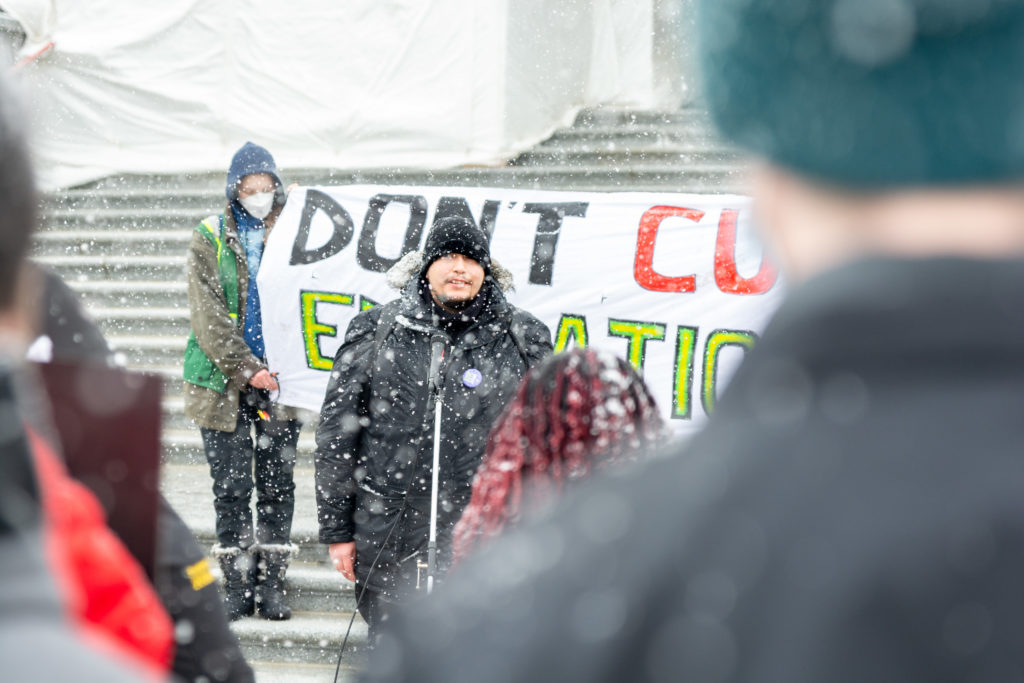
Tyler Beaulac, current law student at the U of A.
The exceptional tuition increases increased tuition for the JD (law) undergraduate program from $11,701.48 to $15,094.84, a 29 per cent increase.
“I know not a lot of people really like lawyers but I’m also Métis… and [exceptional tuition increases] are making access to the legal system itself and to a legal education more difficult for marginalized communities to meet,” Beaulac said. “[Exceptional tuition increases] are going to exacerbate the problem. That’s what [the provincial government] is doing.”
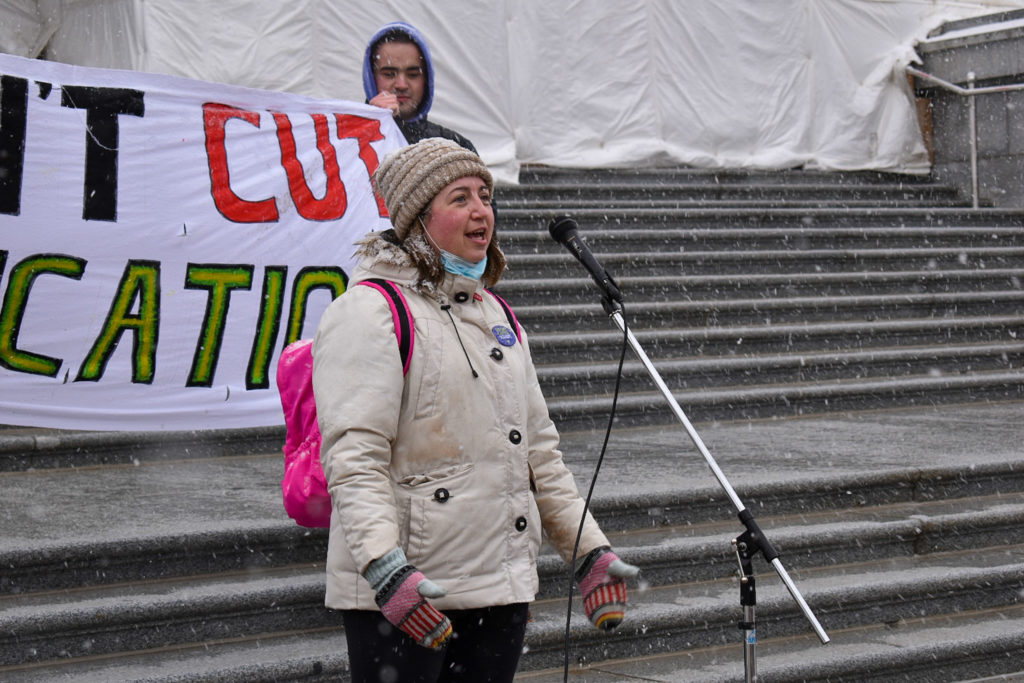
Whitney Corbett spoke on how her experiences as both a mother and a student at the U of A have been effected by budget cuts.
“I actually lost my job to the COVID-19 [pandemic] and came back to school to find myself,” Corbett said. “I’m a mother of two young children and all of these cuts, like they affect you, affect my single-family-income house and I struggled this semester decide how many courses I can afford to take and how long this degree is going to take.”
“We have to stop this.”
Janis Irwin, New Democratic Party (NDP) MLA for Edmonton-Highlands-Norwood was also in attendance at the protest.
She described being “truly inspired” by the turnout at the protest, and encouraged event attendees to continue speaking up against budget cuts and tuition increases directed at post-secondary institutions in the province.
“I’m truly so inspired that you all continue to show up and speak out and fight back,” Irwin said. “You know that me, Rachel Notley, and our team are going to continue to do that as well.”
“[Thank you] Joannie [Fogue] for your comments there around the dismantling of francophone education; we’re seeing that at the K-12 level as well. Adrian [Wattamaniuk], your comments about the impacts on certain faculties [are] huge… so we’re going to keep pushing back, and we’re going to keep fighting for affordability and accessibility.”
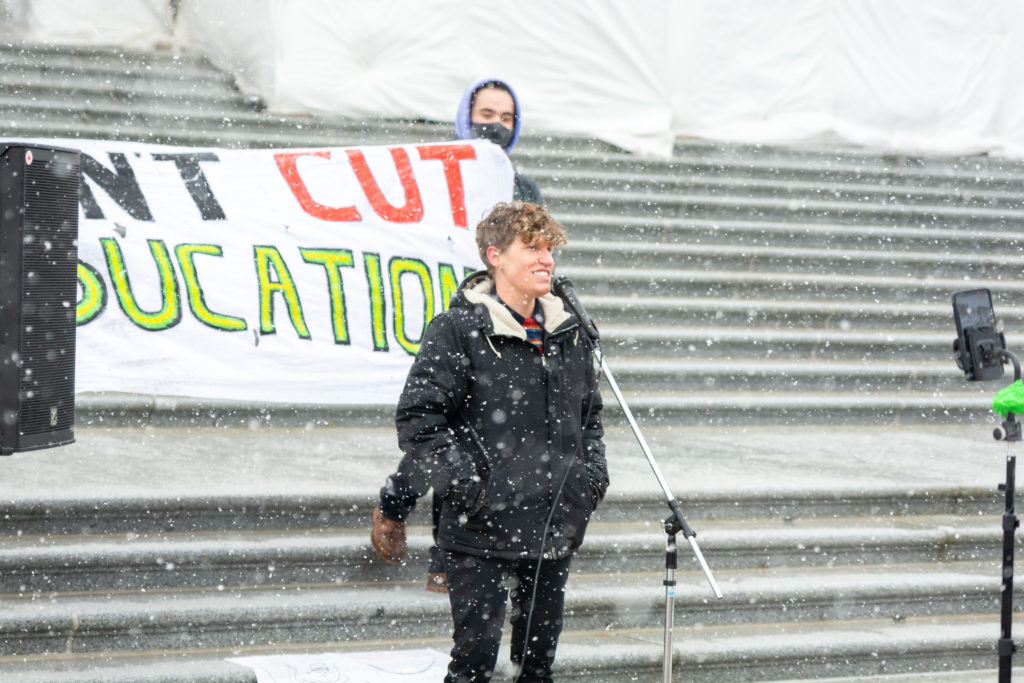
Janis Irwin, NDP MLA for Edmonton-Highlands-Norwood.
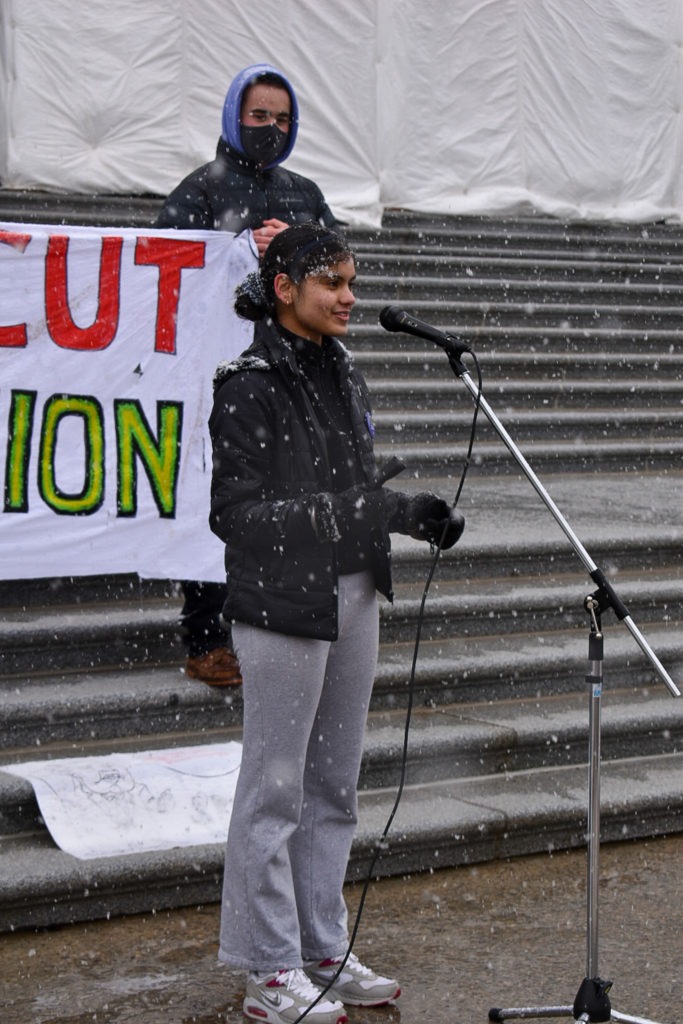
Last to speak at the protest was Gurleen Kaur, second-year international student and current UASU arts councillor. Kaur is also the UASU vice-president (academic) elect for the 2022-2023 academic year. She highlighted the effect budget cuts and tuition increases have had on international students.
“We know that tuition is so high — for international students, it’s a massive amount,” Kaur said. “As an arts student I pay $30,000 per year and for some faculties it’s even more than that… these cuts increase the massive amount further.”
“We are in this together and we need to fight back.”
Additionally, Kaur highlighted the effects unaffordable post secondary education has had on Indigenous students.
“I had an [Indigenous] friend who told me that is so difficult for her to afford her education,” she said. “She is the first from her family to be in university, and it’s really hard for her. It’s really shameful that they are unable to afford education on their own land.”
“We need to tell the government that it should rethink its governance.”




